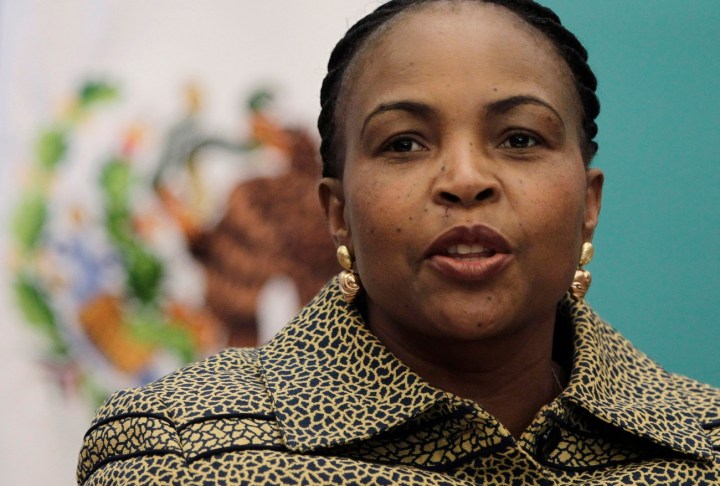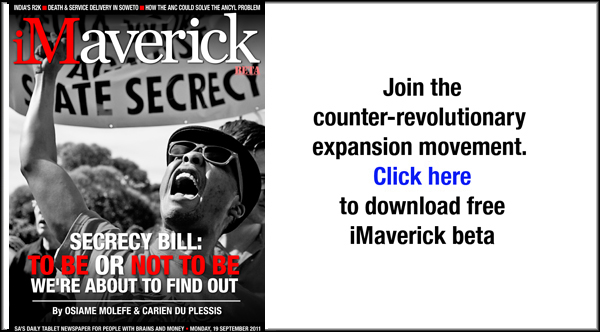Politics
Nkoane-Mashabane ‘handbag incident’: It’s all about R-E-S-P-E-C-T

Since the Mail and Guardian’s splash about international relations minister Maite Nkoane-Mashabane’s handbag, there’s been a lot of ire. The usual suspects have vented their spleens. But her critics are also missing a major part of her story. By STEPHEN GROOTES.
There is a lot to be angry about. The facts are simple, and seem to be undenied (so far) by the ministry. Nkoane-Mashabane was leaving Oslo and going to Bulgaria. Norwegian authorities wanted to scan her handbag as is normal practice. She refused. As a result she missed her flight, and then chartered a jet to take her there. Hence the extra cost of R235,000. Of course, it is complete bollocks that a hissy-fit by a servant of you and me should cost us nearly a quarter of a million rand.
In 2001 then foreign affairs minister Nkosazana Dlamini-Zuma flew into JFK in New York. It was just after 9/11 and the Americans were, well, twitchy about security. They had just unveiled these new-fangled scanners. Dlamini-Zuma took one look at this and said no ways. This lady was not for turning. It was intrusive, it was disrespectful, she thought. And she was the foreign minister of a country, for goodness sake. Surely the officials could realise she wasn’t a risk. And it was an affront to her and to her country to be searched in this way.
Eventually, a call was put in to Condoleezza Rice. She saw at once that this was not on, and told her officials that never again must a South African international relations minister be put through this.
I don’t know Nkoane-Mashabane, and I’ve had very few dealings with Dlamini-Zuma. International relations is not my patch. So I can’t claim to speak for them, or have any deep insight into their feelings, histories or views on the world. But we are missing something by just jumping in to criticise.
It’s this. Their history.
It’s not about the ANC, or its place in the struggle, or what it does now as a representative of our country. It is about the fact that for many of us respect is something we have always enjoyed. For others, it’s something they’ve had to fight tooth and nail for, at great danger to their physical selves and their families.
It’s something we’ve mostly forgotten by now. But under apartheid, a black woman was often not considered an adult. Under the law at the time, she couldn’t sign a legal document. In some cases, that meant she wouldn’t be legally competent to sign any parental forms for her children. And in some awful cases, that happened more than we now remember, she would need a “guardian” to sign on her behalf. This often resulted in her male children signing for her.
Can you imagine what that must have been like? The powerlessness, the helplessness at not being able to actually do anything that mattered. Of having to beg some oafish official to accept a child’s signature.
And then can you think about finally getting past that. Of being able to know that your daughters will not suffer the same fate, because of the blood, sweat, toil and tears of you and your comrades. Of the feelings that must resonate in your chest at knowing those days are gone for good. And joy of joys, you’ve actually been a part of it, you have helped to make this achievement come about. And you are now able to be a party to transforming the country as well, to play an active role in government.
And then, suddenly, while representing this transformed space that is South Africa, BANG, you’re back in 1979. Suddenly – you feel – there’s a person treating you like you’re less than human.
And worse. They’re not just treating you like that. They’re treating you as a representative of your country and all you’ve achieved like that.
My reaction, should I have come from that background, would be to so incandescently angry, I would actually lose the power to speak. I would be so furious I would want to leave that space immediately. And then I would want to return to pound it into the ground.
In 2001 then deputy president Jacob Zuma was searched using the same machinery his ex-wife had objected to. I understand he was not happy, and no doubt, neither were his officials. But he didn’t make the same fuss about it, for reasons I don’t know. But I can guess that while annoyed, it wouldn’t have mattered to him as much, because as a man, he had been given at least some respect during the bad old days. Not much, but some. At least he was a legal entity in his own right (and had been sent to prison on that basis).
This is something very few of us nowadays can feel. I am a white male. I will never properly understand the true humiliation that must have flowed through a 40-year-old women watching their 18-year-old sons signing legal documents on their behalf. White women of that generation won’t understand it (Helen Zille) and neither will black women of a later generation (Lindiwe Mazibuko). Rice never went through the awfulness of apartheid, but clearly the issue resonated with her enough to understand part of the problem.
I cannot claim to have any huge insight into Nkoane-Mashabane or Dlamini-Zuma. My life has been as different to theirs as it is possible to imagine. And I am furious that more than R200,000 has gone, never to be seen again. That’s money that should really have been used for something else. And we should criticise what’s happened here on that basis. But we also mustn’t forget our past. It will obviously determine how different people will react to different events. In many relationships, a man explaining a problem with a car will often sound hugely patronising to his wife. The wife will hear him being a pompous oaf. He will never understand how that can be. Because she feels lectured to, and he feels he’s just educating. And this is between two people who know, and presumably, love each other, and are usually from the same backgrounds.
I’m all for criticising our public officials. Something you may already know about me. And Nkoane-Mashabane and Dlamini-Zuma may feel that I have no business in sticking my nose into theirs. They certainly don’t need protection from the likes of me. But I do think we need to understand the human being we are criticising. Because otherwise the perfectly natural reaction from Nkoane-Mashabane and Dlamini-Zuma will be to just cast their critics into the box marked “disrespectful” to be ignored. When really what we all want is a properly conducted discussion. With plenty of criticism. And respect. DM

Photo: REUTERS



 Become an Insider
Become an Insider